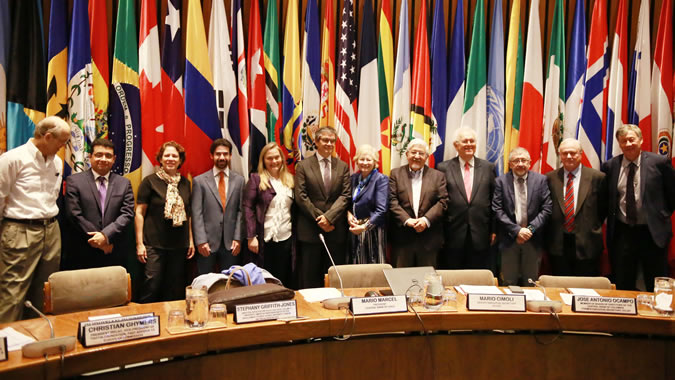Authorities and Experts at ECLAC Analyze the Regional Challenges Posed by the International Financial Crisis
Work area(s)
Seminar held at the UN regional organization’s headquarters in Santiago, Chile, with special participation by the host country’s Central Bank Governor, Mario Marcel.

In a meeting held at ECLAC headquarters in Santiago, Chile, authorities and experts discussed international financial volatility, global economic uncertainty and lower perspectives for growth dynamics in 2019 in the countries of Latin America and the Caribbean.
During the seminar on “Latin America and EU Regionalism: Towards a Cooperative Way-out beyond the Crisis”, distinguished speakers addressed the challenges currently facing the region in terms of fiscal, monetary, economic and institutional reforms in the face of the questioning of multilateralism worldwide.
The meeting, organized by the Interdisciplinary Institute for Relations between Europe, Latin America and the Caribbean (IRELAC), with the support of the Erasmus+ Programme of the European Union and the Economic Commission for Latin America and the Caribbean (ECLAC), was opened by Bettina Guilherme and Christian Ghymers, coordinators of the Monnet Network “Crisis – Equity – Democracy,” IRELAC, and Mario Cimoli, Deputy Executive Secretary, ECLAC.
Following the opening remarks, the governor of Chile’s Central Bank, Mario Marcel, presented a keynote speech on the situation in Latin America in light of recent episodes of financial volatility.
In her opening remarks, Bettina Guilherme explained the scope of the studies undertaken by the Monnet Network and underscored the importance of analyzing the experiences of both Europe and Latin America in their responses to the international crisis. “It is very important that we examine how the processes of integration have been impacted by the crisis, and especially how the most recent populist trends could affect them,” she said.
Meanwhile, Mario Cimoli pointed out that, after the financial crisis of 2008, policymakers today continue to reason based on the same old model, which does not apply to the current economic situation. “We are at a crossroads in terms of how to handle monetary policy, how to definitively surmount the crisis and how to manage the macroeconomic variables,” he stated.
The ECLAC high official added that many tensions at the global level are behind this, especially trade tensions, tensions involving the distribution of income and equity, and micropolicies, with business enterprises based on digital processes and technology that function differently today and have completely transformed the modes of production (e.g. with artificial intelligence and the automation of work).
“Multilateralism is being called into question more than ever. It needs to be strengthened in the face of these global financial and trade tensions,” said Cimoli.
In his speech, the Chilean Central Bank Governor gave a recap of the monetary and financial situation of the countries of the region on the heels of the 2008 crisis and the most recent episodes of uncertainty and global economic volatility. Mario Marcel explained that the emerging economies and those of Latin America were affected by the recent crisis of 2018 with declines in their stock markets, currency depreciation and deterioration of their terms of trade.
“An eventual financial shock reaches the real economy through different channels. Today we are seeing a somewhat weaker fiscal situation in the region, but on the side of monetary policy there are more spaces for action than there were before the international financial crisis,” said the Chilean authority.
Distinguished academics also participated in the seminar at ECLAC, including Stephany Griffith-Jones, Director, Initiative for Policy Dialogue, Columbia University; Ricardo Ffrench-Davis, Professor, University of Chile; and José Antonio Ocampo, Member of the Board of Directors, Central Bank of Colombia and former Executive Secretary of ECLAC.
Type
Country(ies)
- Europe
- Latin America and the Caribbean
Contact
Public Information Unit
- prensa@cepal.org
- (56 2) 2210 2040